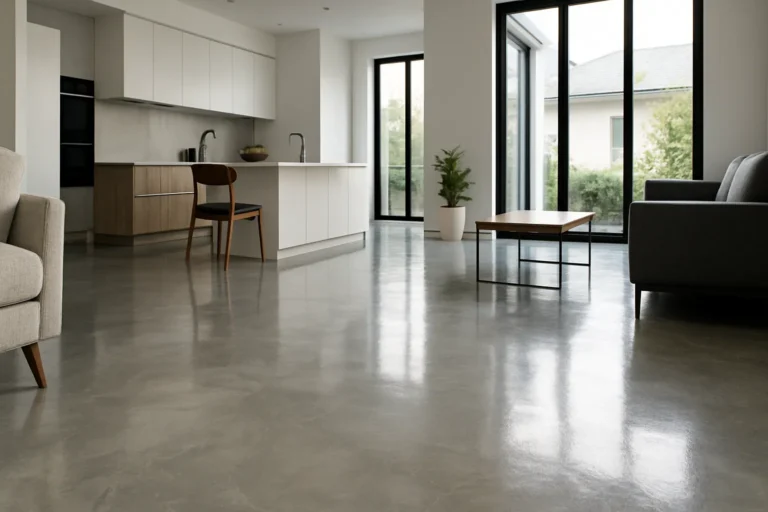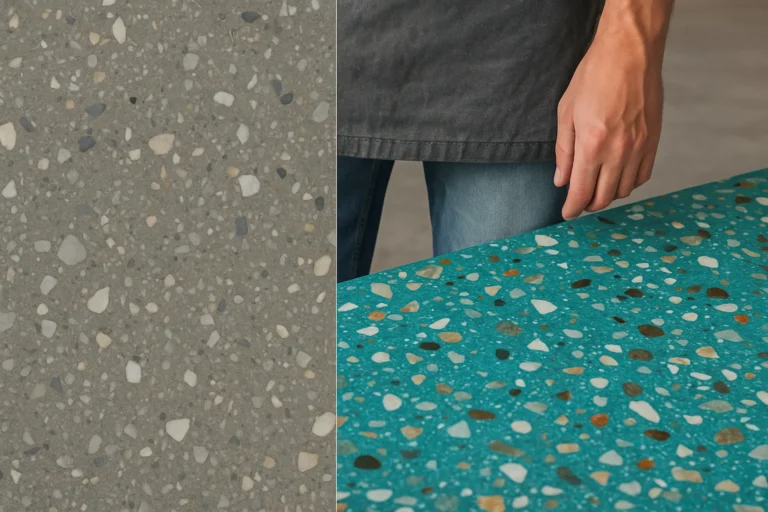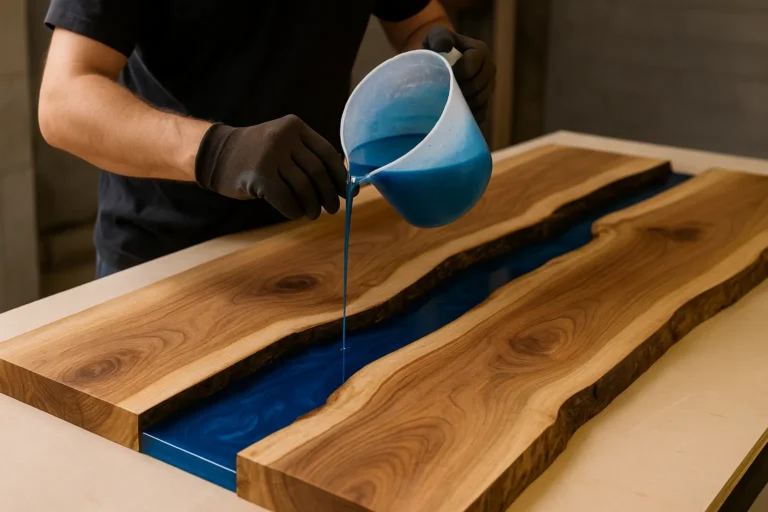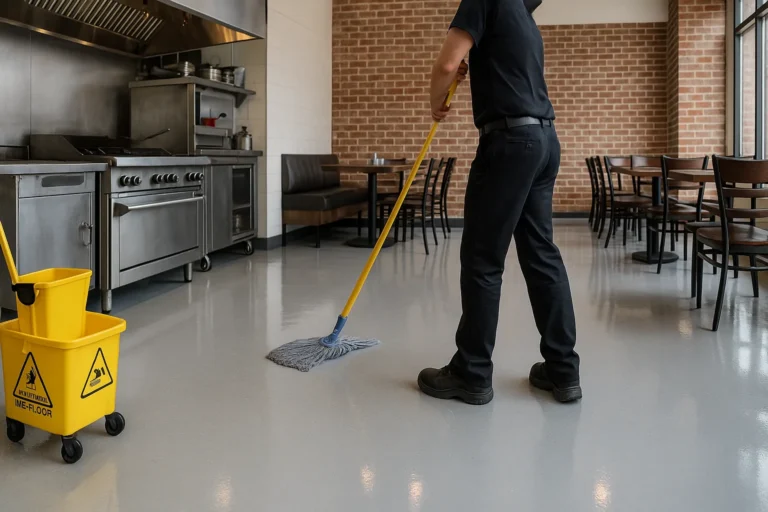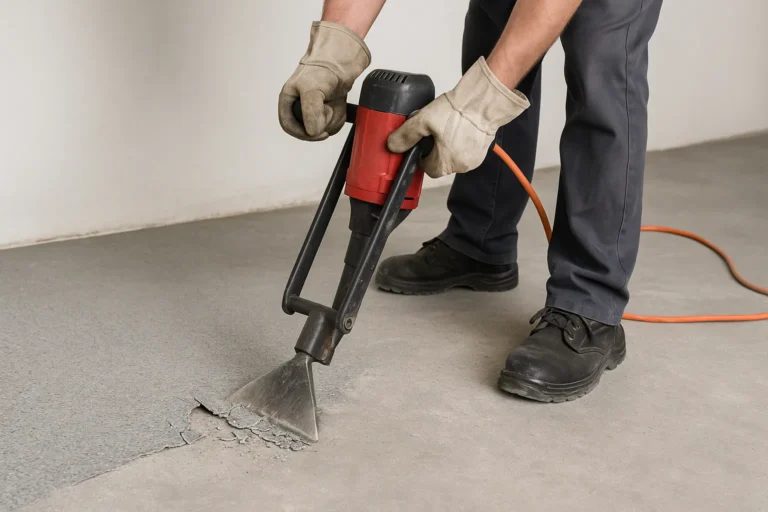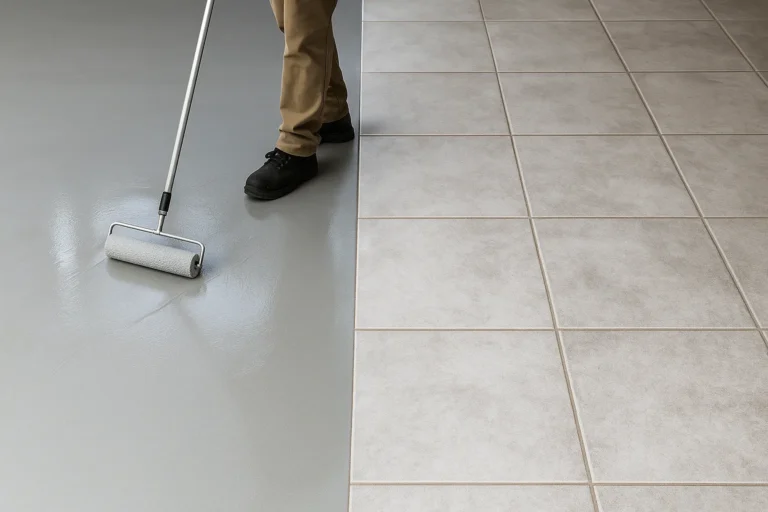What is epoxy flooring?
Epoxy flooring is a high-performance coating system that consists of a two-part resin and hardener mixture. When applied to concrete surfaces, it creates a durable, seamless, and chemical-resistant floor. This versatile flooring solution is widely used in both industrial and commercial settings due to its exceptional strength and aesthetic appeal.
Epoxy flooring offers numerous advantages, including:
- Exceptional durability
- Chemical and stain resistance
- Easy maintenance
- Customizable appearance
- Improved safety features
Key differences between industrial and commercial epoxy flooring
While both industrial and commercial epoxy flooring share similar base components, they differ in several key aspects:
- Thickness: Industrial epoxy flooring is typically thicker, ranging from 60-120 mils, while commercial epoxy flooring is usually 10-30 mils thick.
- Durability: Industrial epoxy floors are designed to withstand heavier loads and more intense wear and tear compared to commercial applications.
- Chemical resistance: Industrial epoxy flooring often has enhanced chemical resistance to withstand exposure to harsh substances commonly found in manufacturing environments.
- Aesthetics: Commercial epoxy flooring tends to focus more on appearance and design options, while industrial applications prioritize functionality.
Benefits of epoxy flooring in industrial and commercial settings
Epoxy flooring offers numerous advantages for both industrial and commercial environments:
Industrial benefits:
- Enhanced safety through slip-resistant surfaces
- Improved productivity with seamless, easy-to-clean floors
- Increased equipment longevity due to impact resistance
- Cost-effective long-term flooring solution
Commercial benefits:
- Attractive, customizable appearance
- Improved light reflectivity for energy efficiency
- Hygienic, easy-to-maintain surfaces
- Durability in high-traffic areas
|
Feature |
Industrial Epoxy Flooring |
Commercial Epoxy Flooring |
|
Thickness |
60-120 mils |
10-30 mils |
|
Primary focus |
Durability and chemical resistance |
Aesthetics and functionality |
|
Typical applications |
Manufacturing plants, warehouses |
Retail stores, offices, hospitals |
|
Cost |
Higher initial investment |
More affordable |
|
Customization options |
Limited |
Extensive |
Types of Epoxy Flooring Systems
Self-leveling epoxy floors
Self-leveling epoxy floors are popular in both industrial and commercial settings due to their smooth, seamless finish. This type of epoxy flooring is ideal for covering imperfections in the existing concrete substrate and creating a perfectly level surface.
Key features of self-leveling epoxy floors include:
- Excellent flow and self-smoothing properties
- High-gloss finish
- Ideal for large, open areas
- Quick installation and curing time
Mortar epoxy floors
Mortar epoxy floors are highly durable and designed to withstand extreme conditions in industrial environments. These floors are created by mixing epoxy resin with sand or other aggregates, resulting in a thick, trowel-applied coating.
Benefits of mortar epoxy floors:
- Exceptional impact and abrasion resistance
- Suitable for heavy machinery and high-traffic areas
- Can be used to repair damaged concrete surfaces
- Excellent chemical resistance
Flaked epoxy floors
Flaked epoxy floors, also known as chip floors, combine aesthetics with functionality. These floors are created by broadcasting decorative flakes or chips onto a base coat of epoxy and then sealing them with a clear topcoat.
Advantages of flaked epoxy floors:
- Attractive, customizable appearance
- Slip-resistant surface
- Hides minor imperfections in the substrate
- Suitable for both industrial and commercial applications
Quartz-filled epoxy floors
Quartz-filled epoxy floors offer a balance of durability and decorative appeal. These floors are created by combining epoxy resin with colored quartz aggregates, resulting in a textured, slip-resistant surface.
Key features of quartz-filled epoxy floors:
- Excellent traction and slip resistance
- High durability and impact resistance
- Customizable color combinations
- Ideal for wet or high-traffic areas
Applications of Industrial and Commercial Epoxy Flooring
Manufacturing facilities
Epoxy flooring is an excellent choice for manufacturing facilities due to its durability and resistance to chemicals, impacts, and heavy loads. It provides a safe, easy-to-clean surface that can withstand the rigors of industrial processes.
Common applications in manufacturing facilities:
- Production lines
- Assembly areas
- Storage and shipping zones
- Equipment maintenance areas
Warehouses and distribution centers
Epoxy flooring is ideal for warehouses and distribution centers, offering a smooth, durable surface that can withstand heavy forklift traffic and frequent cleaning. It also enhances safety and improves overall efficiency in these high-traffic environments.
Benefits of epoxy flooring in warehouses:
- Resistance to heavy loads and impacts
- Easy maintenance and cleaning
- Improved visibility through light reflectivity
- Customizable line markings and safety zones
Retail spaces
Commercial epoxy flooring is an attractive and practical option for retail environments. It offers a wide range of design possibilities while providing a durable, easy-to-maintain surface that can withstand constant foot traffic.
Advantages of epoxy flooring in retail spaces:
- Customizable colors and patterns to match branding
- Seamless, hygienic surface
- Resistance to stains and spills
- Long-lasting, cost-effective flooring solution
Healthcare facilities
Epoxy flooring is an excellent choice for healthcare facilities due to its hygienic properties and ease of maintenance. It provides a seamless, non-porous surface that inhibits the growth of bacteria and other microorganisms.
Key benefits for healthcare applications:
- Easy to clean and disinfect
- Chemical resistance to harsh cleaning agents
- Slip-resistant options for improved safety
- Customizable designs for wayfinding and aesthetics
Educational institutions
Epoxy flooring is well-suited for educational institutions, offering durability, easy maintenance, and design flexibility. It can withstand the high foot traffic and frequent cleaning required in schools and universities.
Applications in educational settings:
- Classrooms and laboratories
- Cafeterias and common areas
- Gymnasiums and locker rooms
- Hallways and entryways
Durability and Performance of Epoxy Flooring
Chemical resistance
Epoxy flooring offers excellent chemical resistance, making it ideal for industrial and commercial environments where exposure to harsh substances is common. The level of chemical resistance can be customized based on the specific needs of the facility.
Factors affecting chemical resistance:
- Type of epoxy resin used
- Thickness of the epoxy coating
- Specific chemicals present in the environment
Abrasion resistance
Epoxy flooring provides superior abrasion resistance compared to many other flooring options. This property is particularly important in high-traffic areas and industrial settings where heavy equipment and machinery are used.
Benefits of abrasion-resistant epoxy flooring:
- Reduced wear and tear
- Extended lifespan of the flooring system
- Lower maintenance and replacement costs
- Improved safety for workers and visitors
Impact resistance
Impact resistance is a crucial feature of epoxy flooring, especially in industrial environments where heavy objects may be dropped or equipment may cause impacts. High-quality epoxy flooring can withstand significant impacts without cracking or chipping.
Factors influencing impact resistance:
- Thickness of the epoxy coating
- Type of epoxy resin used
- Presence of reinforcing additives or aggregates
Thermal shock resistance
Thermal shock resistance is the ability of epoxy flooring to withstand rapid temperature changes without cracking or delaminating. This property is essential in industrial settings where extreme temperature fluctuations may occur.
Applications requiring thermal shock resistance:
- Food processing facilities
- Pharmaceutical manufacturing plants
- Commercial kitchens
- Cold storage areas
Customization Options for Epoxy Flooring
Color selection
Epoxy flooring offers a wide range of color options, allowing for customization to match branding, enhance aesthetics, or improve safety through color-coding. From solid colors to metallic finishes, the possibilities are virtually endless.
Popular color options for epoxy flooring:
- Neutral tones (gray, beige, white)
- Bold, vibrant colors for accent areas
- Metallic and pearlescent finishes
- Custom color matching for brand consistency
Patterns and designs
Epoxy flooring can be customized with various patterns and designs to create unique, eye-catching surfaces. These design options are particularly popular in commercial settings but can also be used in industrial environments for safety and organizational purposes.
Common pattern and design options:
- Marbled effects
- Geometric patterns
- Faux stone or wood looks
- Custom graphics and logos
Texture and slip resistance
Epoxy flooring can be customized with different textures and slip-resistant additives to improve safety in both industrial and commercial settings. This is particularly important in areas prone to spills or wet conditions.
Slip-resistant options for epoxy flooring:
- Broadcast aggregate systems
- Textured topcoats
- Anti-slip additives
- Quartz or flake systems
Logos and branding integration
Epoxy flooring allows for the seamless integration of logos, branding elements, and wayfinding graphics directly into the floor surface. This customization option is particularly valuable for commercial spaces and can also be used in industrial settings for safety and organizational purposes.
Benefits of logo and branding integration:
- Enhanced brand visibility
- Improved wayfinding and navigation
- Customizable safety markings
- Unique, professional appearance
Installation Process for Industrial and Commercial Epoxy Flooring
Surface preparation
Proper surface preparation is crucial for the successful installation of epoxy flooring. This step ensures optimal adhesion and longevity of the epoxy coating.
Key steps in surface preparation:
- Cleaning and degreasing the concrete surface
- Repairing cracks, holes, and other imperfections
- Profiling the surface through grinding or shot blasting
- Moisture testing to ensure proper conditions for epoxy application
Primer application
Applying a primer is an essential step in the epoxy flooring installation process. The primer helps to improve adhesion between the concrete substrate and the epoxy coating, ensuring a long-lasting and durable floor.
Benefits of using a primer:
- Enhanced adhesion of the epoxy coating
- Improved moisture resistance
- Reduced risk of pinholes and other surface defects
- Extended lifespan of the epoxy flooring system
Epoxy coating application
The application of the epoxy coating is a critical step in the installation process. Proper techniques and equipment are essential to achieve a smooth, even finish and optimal performance.
Steps in epoxy coating application:
- Mixing the epoxy resin and hardener according to manufacturer specifications
- Applying the epoxy using rollers, squeegees, or spray equipment
- Broadcasting aggregates or decorative flakes, if desired
- Applying additional layers or topcoats as needed
Curing and finishing
The curing process is crucial for the development of the epoxy flooring’s full strength and chemical resistance. Proper curing conditions and techniques ensure optimal performance and longevity of the flooring system.
Factors affecting the curing process:
- Temperature and humidity levels
- Ventilation and air circulation
- Type of epoxy resin used
- Thickness of the applied coating
Maintenance and Care for Epoxy Floors
Daily cleaning procedures
Regular cleaning is essential to maintain the appearance and performance of epoxy flooring. Daily cleaning procedures help to prevent the buildup of dirt, debris, and potential contaminants.
Recommended daily cleaning steps:
- Sweep or dust mop the floor to remove loose debris
- Spot clean spills and stains immediately
- Damp mop with a pH-neutral cleaner for general cleaning
- Avoid using harsh chemicals or abrasive cleaning tools
Periodic deep cleaning
In addition to daily maintenance, periodic deep cleaning is necessary to keep epoxy floors in optimal condition. The frequency of deep cleaning depends on the specific environment and level of use.
Deep cleaning techniques for epoxy floors:
- Use of automatic floor scrubbers for large areas
- Application of specialized cleaning solutions for stubborn stains
- High-pressure washing for industrial environments
- Buffing or burnishing to restore shine in commercial settings
Repair and touch-up techniques
Despite their durability, epoxy floors may occasionally require repairs or touch-ups due to heavy use or accidental damage. Proper repair techniques can help extend the life of the flooring system and maintain its appearance.
Common repair and touch-up procedures:
- Filling small cracks or chips with epoxy filler
- Reapplying topcoats to restore shine and protection
- Patching larger damaged areas with matching epoxy material
- Addressing delamination issues through proper surface preparation and reapplication
Cost Considerations for Industrial and Commercial Epoxy Flooring
Initial installation costs
The initial cost of installing epoxy flooring can vary widely depending on several factors. While epoxy flooring may have a higher upfront cost compared to some traditional flooring options, its long-term benefits often outweigh the initial investment.
Factors affecting installation costs:
- Size of the area to be covered
- Condition of the existing substrate
- Type of epoxy system chosen
- Customization options and design complexity
- Labor costs in the specific region
Long-term cost savings
Epoxy flooring offers significant long-term cost savings due to its durability, low maintenance requirements, and extended lifespan. These factors contribute to a lower total cost of ownership compared to many other flooring options.
Long-term cost benefits of epoxy flooring:
- Reduced maintenance and cleaning costs
- Lower frequency of repairs and replacements
- Improved energy efficiency due to light reflectivity
- Enhanced productivity in industrial settings
Factors affecting pricing
Several factors can influence the pricing of epoxy flooring installations. Understanding these factors can help facility managers and business owners make informed decisions when choosing an epoxy flooring system.
Key pricing factors:
- Type and quality of epoxy resin used
- Thickness of the epoxy coating
- Customization options and design complexity
- Surface preparation requirements
- Geographic location and local market conditions
Environmental Impact and Sustainability of Epoxy Flooring
VOC emissions
Volatile Organic Compound (VOC) emissions are an important consideration when choosing epoxy flooring systems. Many modern epoxy formulations offer low-VOC or zero-VOC options, contributing to improved indoor air quality and environmental sustainability.
Benefits of low-VOC epoxy flooring:
- Reduced environmental impact
- Improved indoor air quality
- Compliance with strict environmental regulations
- Potential contribution to LEED certification points
Energy efficiency
Epoxy flooring can contribute to improved energy efficiency in both industrial and commercial settings. The smooth, reflective surface of epoxy floors can enhance lighting effectiveness, potentially reducing energy consumption for artificial lighting.
Energy-saving benefits of epoxy flooring:
- Increased light reflectivity
- Reduced need for artificial lighting
- Potential for lower heating and cooling costs
- Improved overall building energy efficiency
Recyclability and waste reduction
Epoxy flooring systems can contribute to waste reduction and sustainability efforts in several ways. The long lifespan of epoxy floors reduces the need for frequent replacements, while some epoxy systems incorporate recycled materials or can be recycled at the end of their useful life.
Sustainability features of epoxy flooring: Plywood epoxy considerations When using epoxy on plywood make sure the wood is clean and dry before applying the epoxy to ensure a strong bond and avoid bubbles or peeling later on Durable epoxy flooring is a tough and long-lasting floor coating that protects concrete surfaces
Resilient epoxy floors are super strong and long-lasting floors that can handle heavy use and spills without getting damaged Durable salon epoxy is a strong and long-lasting floor coating used in hair salons It protects the floor from spills and damage while giving a shiny professional look
Salon epoxy designs are special patterns made with colorful resin on salon floors and counters Durable aesthetic flooring looks great and lasts a long time It can make your home or office beautiful for many years
Collaborative epoxy spaces are special areas where people work together to create things using sticky materials Metallic epoxy flooring is a shiny and colorful type of floor coating that looks like swirling metal It makes regular floors look fancy and is very strong and easy to clean
Chemical resistant epoxies Flooring UAE comparison helps people choose the best floors for their homes and offices by looking at different types prices and quality from many companies in the UAE Epoxy polyaspartic comparison Epoxy and polyaspartic are both floor coatings but polyaspartic dries faster and is more flexible while epoxy is thicker and cheaper
- Extended lifespan reduces waste from frequent replacements
- Some systems incorporate recycled glass or other materials
- Potential for recycling or repurposing at end-of-life
- Reduced need for harsh cleaning chemicals
Comparing Epoxy Flooring to Other Flooring Options
Epoxy vs. polished concrete
Epoxy flooring and polished concrete are both popular options for industrial and commercial settings. Each has its own advantages and considerations.
Comparison of epoxy and polished concrete:
- Durability: Both offer excellent durability, with epoxy providing superior chemical resistance
- Aesthetics: Epoxy offers more customization options, while polished concrete has a natural look
- Maintenance: Epoxy is generally easier to maintain and clean
- Cost: Polished concrete may have a lower initial cost, but epoxy can offer long-term cost savings
Epoxy vs. vinyl flooring
Epoxy flooring and vinyl flooring are both used in commercial settings, but they have distinct differences in performance and appearance.
Key differences between epoxy and vinyl flooring:
- Durability: Epoxy is more durable and resistant to wear and tear
- Chemical resistance: Epoxy offers superior chemical resistance compared to vinyl
- Installation: Vinyl is typically easier and faster to install
- Cost: Vinyl may have a lower initial cost, but epoxy offers better long-term value
Epoxy vs. tile flooring
Epoxy flooring and tile flooring are both popular choices for commercial and some industrial applications. Each has its own set of advantages and considerations.
Comparison of epoxy and tile flooring:
- Seamless surface: Epoxy provides a seamless surface, while tile has grout lines
- Customization: Epoxy offers more design flexibility and customization options
- Durability: Both can be durable, but epoxy typically offers
FAQs
What is the difference between industrial and commercial epoxy flooring?
Industrial epoxy flooring is designed for heavy machinery and extreme conditions, while commercial epoxy flooring is tailored for aesthetic appeal and moderate foot traffic.
How long does industrial epoxy flooring last?
Industrial epoxy flooring typically lasts 10-20 years, depending on usage and maintenance.
Is epoxy flooring suitable for high-traffic commercial areas?
Yes, epoxy flooring is highly durable and ideal for high-traffic commercial spaces.
Can epoxy flooring be installed over existing concrete floors?
Yes, epoxy flooring can be applied over existing concrete if the surface is clean and properly prepared.
What are the advantages of epoxy flooring for industrial facilities?
Epoxy flooring offers durability, chemical resistance, easy maintenance, and slip resistance, making it ideal for industrial use.
